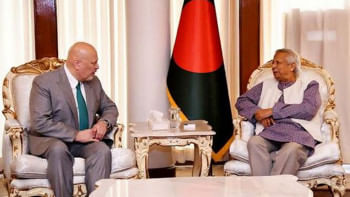An unorthodox business destination: Laos

Stories of Bangladeshis traversing the world in search of employment or business are common. From South Korea to Abu Dhabi, from Europe to Australia, there shall be Bangladeshis creating a livelihood to be found. But in landlocked Laos, a communist nation of just 6.8 million people where subsistence farming yet accounts for half of GDP and 80 percent of national employment, the business opportunities are less obvious.
Vientiane, the subdued Laotian capital is a small city of leafy streets, French colonial buildings and Buddhist temples. Located on the Mekong riverbank adjacent to northeast Thailand, the city is charming but it is hardly an international business hub. Yet, for a small number of intrepid Bangladeshis, the city has become a second home.
In 1990, Laos first opened up to tourism, with barely 80,000 visitors to the country that year. But its laidback culture and mountain landscapes have proved popular and by 2010, visitor numbers had reached nearly two million a year.
In Vientiane, this new industry has prompted the opening of numerous guesthouses, cafes and restaurants; among them is the Dhaka Hotel and Restaurant, the brainchild of an entrepreneur from Bagerhat, Majharul Hoque.
“I first came to Vientiane over a decade ago,” says Hoque. “I'd spent time in Bangkok, Singapore, Malaysia and Japan because I was looking for a place that would be good for doing business.” It was then, in 2005, that a friend posted with the UNDP in Vientiane invited Hoque to visit.
“I saw that the Bangladeshi community was small here,” he recalls. “It was actually larger then because a few hundred garment workers used to be attached to a Korean company.”
During his visit, Hoque became acquainted with the Tamil owner of Nazim Restaurant, one of perhaps three Indian restaurants in Vientiane. A few Bengalis worked there too, and it was the restaurant's owner-manager who encouraged Hoque to stay, helping him to find his feet in the country.
“Laos has advantages,” says Hoque. “To start a business in Thailand requires significant capital, while in Singapore, costs are huge. Malaysia offers good profits but doing business in Laos is easier, and profit margins are good here too.”
In Laos, Hoque believed he could make a start with modest capital, which suited his circumstances.
With his father in Bagerhat having been a shrimp and paddy trader, and an older brother running a pharmacy, Hoque's family was supportive of his business dream. “Go ahead and try,” they told him. “See if you can make a good life there.”
Yet, despite his family's blessing and help from his Tamil friend, there were challenges.
“Without knowledge of the Lao language it isn't easy to get started,” says Hoque. “I was lucky because I knew some Thai, which is related, and although I never had Lao lessons it becomes easy to pick up the language from listening to the locals, if one really wants to.”
In 2008, Hoque organised a business licence and opened his first restaurant in Vientiane's Moni Market. “All the ingredients are brought from Thailand,” he says. “It's still the case. In the markets of Bangkok, you can buy any of our usual ingredients, with Indian-imported spices and curry available.”
As business prospered, Hoque became accustomed to living in Laos. “I drink less tea here than at home,” he says, “And I miss my family and chatting with friends. I miss some food items like hilsa fish and bitter gourd. But Lao coffee is really delicious, the quality of local silk is excellent and Lao people are quiet and easy to get along with.”
In Vientiane, Hoque also found two mosques for his prayers: one Indian and Pakistani, the other Cambodian.
But the highlight of doing business in Laos for Hoque is security.
“Here, you can do your work,” he says. “The business won't make a loss and nobody will disturb you. I have no problems with any local mafia, the government or from political strife. Since 2005, I have never seen a hartal.”
Indeed the security situation is so good that Hoque insists carrying any amount of money through Vientiane's streets in a polythene bag is not a problem. “Day or night, no one will take it,” he says.
With the continual stream of tourists to the country, Hoque has been able to grow his business into a chain of three restaurants and one guesthouse. He currently employs three Laotians and 17 Bangladeshis, which makes him potentially the largest employer of Bangladeshis in the country.
“People come and go,” Hoque says. “But there are only around 40 Bangladeshis in all of Laos.”


 For all latest news, follow The Daily Star's Google News channel.
For all latest news, follow The Daily Star's Google News channel. 



Comments